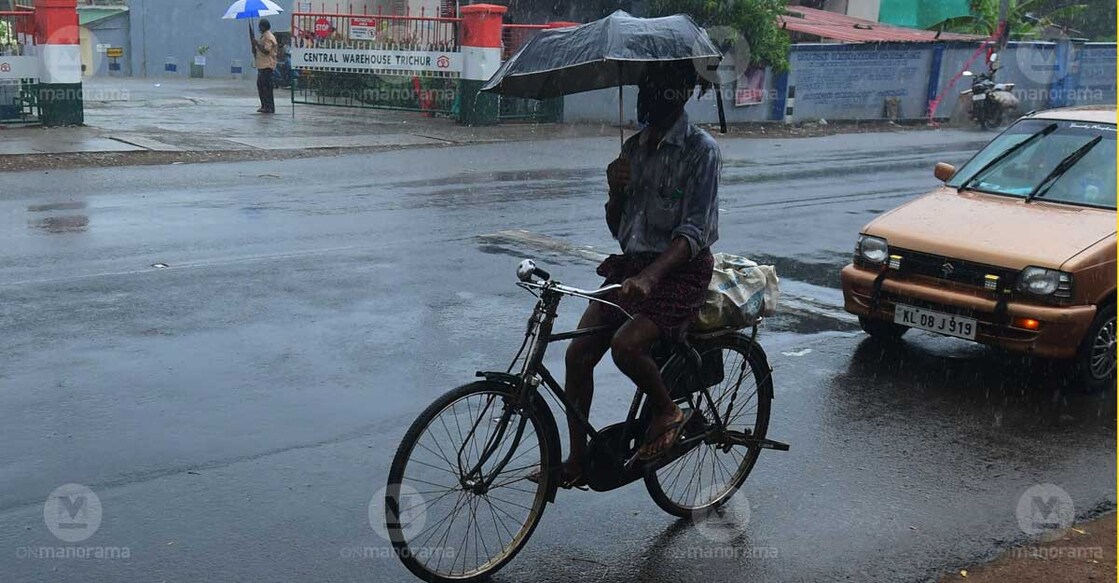Heavy rains likely across Kerala, orange alert in 6 districts on Friday

Mail This Article
Thiruvananthapuram: Kerala is likely to receive heavy rains this week, the weather department has predicted, prompting authorities to sound heavy to very heavy rain alerts in a few districts.
The IMD said a low pressure is likely to form in the south eastern part of Arabian sea on May 14.
Heavy rains and strong winds have been predicted in Kerala and Lakshadweep for the next five days.
As the sea will be very rough, all kinds of fishing activity has been banned in the state from midnight, Chief Minister Pinarayi Vijayan said during his customary sunset briefing. Those who are already out in the seas were asked to reach nearest harbour at the earliest.
Owing to the rough weather condition, the Kerala government has requested everyone to follow safety guidelines issued by the Kerala State Disaster Management Authority. The SDRF and other emergency departments have been kept on standby for any untoward incidents.
An orange code warning has been issued for Kollam, Pathanamthitta, Alappuzha, Kottayam, Ernakulam and Idukki for May 14 as there is a possibility of very heavy rains between 115.6 millimetre and 204.4 mm for 24 hours.
According to the IMD, a downpour in the range of 64.5 mm and 115.5 mm is considered 'heavy rainfall' (yellow alert).
The SDMA has urged the people living in landslide prone areas and coastal areas to take precautions.
It also directed authorities to take steps to open relief camps adhering to COVID-19 protocol.
People should avoid travelling through high-range areas during the night, it said.
Officials said a fisherman from the coastal town of Anchuthengu in Thiruvananthapuram died after being struck by lightning while he was engaged in fishing on Tuesday night.
Low-laying areas may face flood-like situation due to water-logging. Authorities have been told to take necessary precautions in these areas.
SDMA guidelines issued for public:
• In view of cyclone warning, people are advised to cooperate with the authorities and follow their instructions.
• Those who are advised to relocate from their places, should move to safer places as soon as possible.
People living along the sea shores should be cautious as the sea-level may rise sharply even before the formation of low pressure. Fishing gear should be kept safe.
• Those who live in damaged houses and houses without strong roof should be prepared to move for safety in the face of warnings in the coming days.
• Endangered trees, posts, hoardings and boards in private and public places should be secured and trees should be pruned. People urged to bring the attention of authorities to such places.
• One must completely adhere to COVID-19 protocols in relief camps.
• During heavy rains, do not attempt to cross rivers, bathe in rivers or other bodies of water for fishing or any other purpose.
• Do not stand on bridges over water bodies to view or take selfies or stand in groups.
• Those living near the dams should make preparations in anticipation of the possibility of water release from dams and relocate if necessary on the advise of the authorities.
• Avoid travelling to hilly areas.
• People living in high-risk areas advised to keep an emergency kit.
What makes an emergency kit:
1. At least one litre drinking water for one person.
2. Non-perishable food items like biscuits, rusk, peanut, raisins, dates, cashew nut etc.
3. First-aid kit. If any of the family members suffer from diabetes, blood pressure, cardiac or life threatening diseases, the first-aid kit should have their medicines too. Chlorine tablets should also be included in the kit for disinfecting water.
4. Important documents like deeds, certificates, passport etc. must be put in a platic cover and kept safe inside the bag.
5. A battery-powered radio for receiving emergency broadcasts.
6. Sanitary pads, tooth brush and paste etc.
7. At least one pair of cloths.
8. If any of the family members are differently-abled, their equipments or devises for their assistance.
9. Candles and match-boxes.
10. A whistle to attract attention in case of emergency.
11. A knife or blade for using in emergency situation.
12. Mobile phone, charger and power-bank.
13. Masks, soap and sanitiser.
The kit should be kept at a safe and easily accessible place. Everyone in the family should know about the kit and where it is kept.

